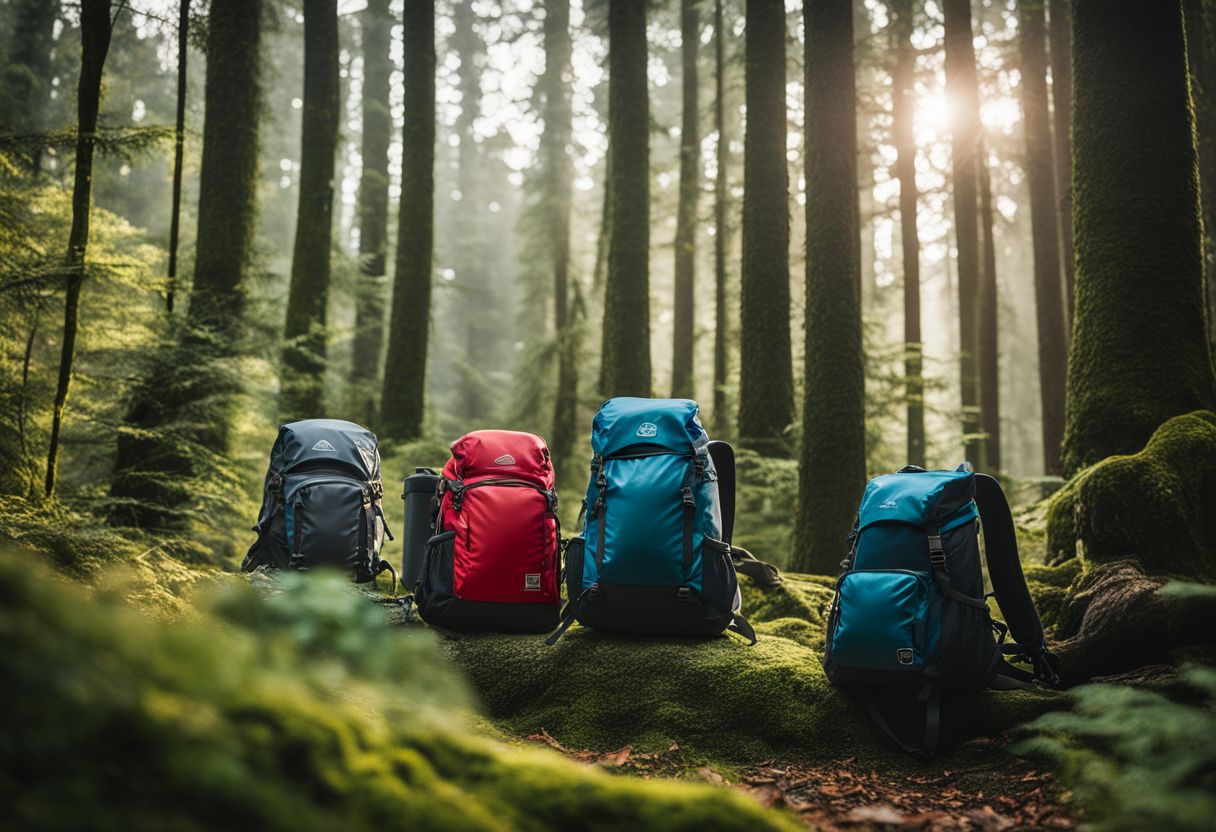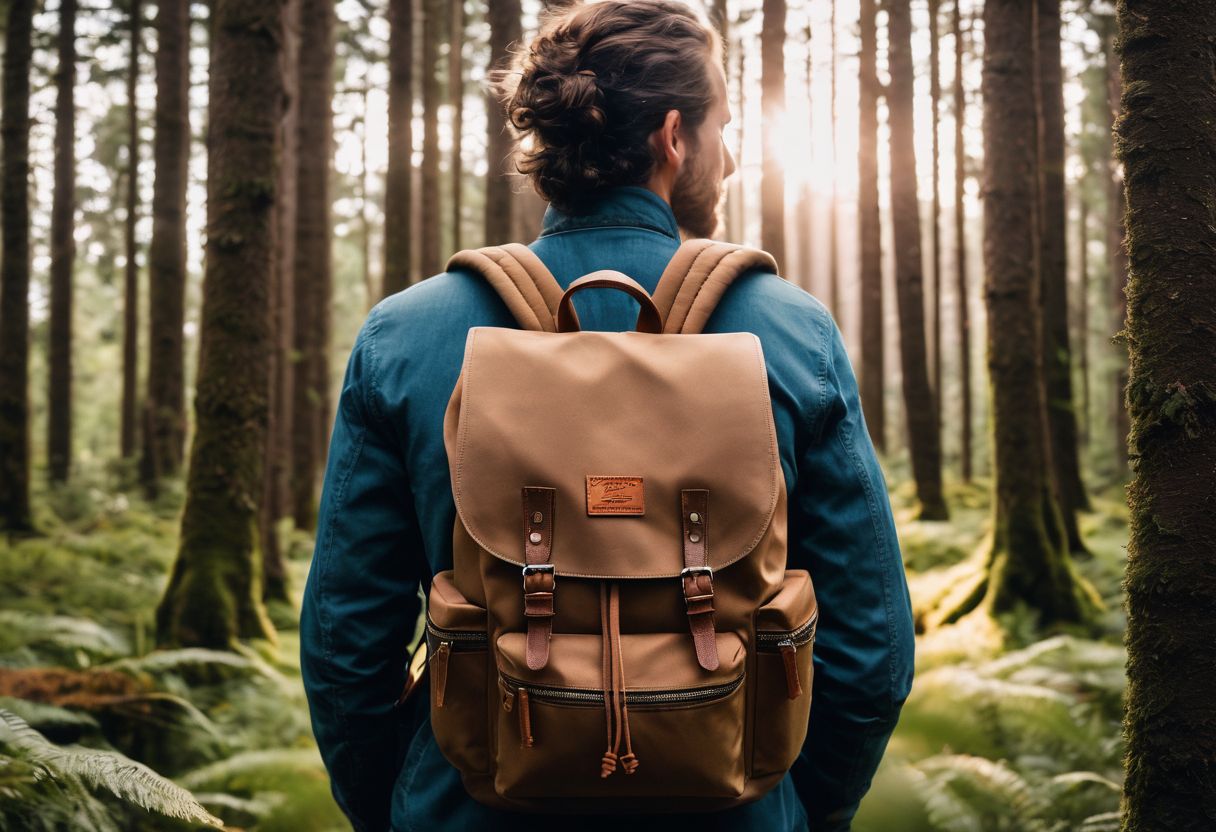As the world shifts towards more ethical and sustainable practices, one common challenge arises for conscious consumers: finding a robust rucksack that aligns with their vegan lifestyle.
With years of experience in sustainable fashion, I’ve unearthed an array of innovative materials that promise durability without compromising on ethics. Navigating this landscape requires not just an eye for style but a commitment to the planet and its inhabitants.
Nowadays, it’s not enough to simply choose any backpack off the shelf; discerning eco-warriors demand products crafted from cruelty-free sources. Factoring in this paradigm shift, my deep dive into vegan material options for rucksacks caters to both your functional needs and moral compass.
Uncover alternatives that stand tall against traditional counterparts yet remain gentle on nature. Keep reading; transform the way you carry your essentials.
Key Takeaways
- When looking for a vegan rucksack, avoid materials like leather, suede, wool, silk, down, and fur.
- Opt for sustainable and ethical alternatives such as recycled materials like PET polyester and nylon, plant-based options like cotton or cork, and PETA-approved vegan leather.
- Top vegan rucksack brands include LaBante London, Doshi, Matt & Nat, and Herschel Supply Co., known for their quality and commitment to ethical practices.
What to Look for in a Vegan Rucksack

When searching for a vegan rucksack, it’s crucial to avoid materials such as leather, wool, and silk. Look for sustainable and ethical alternatives like recycled materials, plant-based options, or PETA-approved vegan leather to ensure that your backpack aligns with your values.
Materials to avoid
Choosing the right rucksack means knowing what materials you should stay away from. Always skip using bags made from animal skin, like leather or suede.
- Leather: Made from animal hide, it’s a big no for vegan backpacks.
- Suede: This is also animal hide but with a soft finish.
- Wool: It comes from animals like sheep, so it’s not vegan.
- Silk: Silkworms are used to make silk, which harms them.
- Down: Feathers plucked from ducks or geese are used for padding, which isn’t kind to animals.
- Fur: Avoid any bag that uses real fur as it comes directly from animals.
Sustainable and ethical alternatives
Sustainable and ethical alternatives for rucksacks are a smart choice for the planet. Look for eco-friendly backpacks made from materials like recycled nylon or polyester, which come from old plastic bottles and clothes.
This means less waste in landfills and less harm to the earth. Brands are also using cool stuff like apple leather, cork, and kraft paper to make strong bags without hurting any animals.
Another great option is hemp backpacks; hemp grows fast and doesn’t need much water or chemicals. People who care about animals will be happy with PETA-approved vegan leather that feels like real leather but comes from plants or synthetic fibers.
These choices help you stay stylish while also being kind to nature and creatures big and small. And when you pick a bag made by companies that follow the Ethical Trading Initiative, you know workers get treated right too.
Eco-Friendly Vegan Material Options for Rucksacks

– Recycled materials like PET polyester and nylon are excellent eco-friendly options for rucksacks, with brands like Baku offering stylish and durable backpacks made from post-consumer waste.
Recycled materials (e.g. Baku backpack)
The Baku backpack is a shining example of how old things can get a new life; it’s made from stuff that has been used before, like water bottles. Think about this: each Baku backpack keeps waste out of landfills and uses less energy to make than new materials would.
It feels good to carry something that helps the earth. And since many rucksacks blend recycled polyester with nylon, you’re helping in more ways than one.
Choosing a bag like the Baku means your fashion choice doesn’t hurt animals or our planet. Imagine turning plastic bottles into a stylish backpack – that’s smart and cool! Brands are getting creative by using 100% post-consumer materials to craft bags that look great and last long.
By picking these kinds of bags, you show love for the Earth every time you zip them up and head out the door.
Plant-based materials (e.g. cotton, cork, hemp)
Cotton, cork, and hemp are eco-friendly materials perfect for vegan rucksacks. Cork fabric offers a sustainable alternative to animal leather and harmful plastics. Hemp fabric quickly biodegrades in about three months, making it an environmentally friendly choice.
These plant-based materials enable fabric sustainability while reducing environmental impact.
These options align with ethical fashion and the push towards sustainable choices promoted by influential figures like Stella McCartney. They contribute to the broader movement of slow fashion and offer practical benefits along with reduced environmental impact.
PETA-approved vegan leather
PETA-approved vegan leather, made from synthetic materials like PVC and PU, is a popular choice for those seeking ethical alternatives to traditional leather. It’s considered non-toxic and environmentally friendly.
This eco-friendly replacement for animal leather offers a cruelty-free option without compromising on style or quality. By choosing PETA-approved vegan leather for rucksacks, consumers contribute to the welfare of animals while enjoying durable and fashionable bags.
Top Vegan Rucksack Brands
LaBante London, Doshi, Matt & Nat, and Herschel Supply Co. are some of the top vegan rucksack brands known for their quality and ethical practices.
LaBante London
LaBante London is a luxury brand that makes 100% vegan bags, including backpacks, laptop bags, totes, crossbody bags, and wallets. They are against using leather because of its harm to animals and prioritize sustainability in their materials.
LaBante London’s products are PETA-approved vegan, ensuring ethical standards. Their backpacks use durable and recyclable materials while maintaining quality and sustainability. The brand focuses on crafting luxurious designer vegan handbags from PU and recycled polyester for consumers seeking sustainable options.
Doshi
Doshi stands out as a prominent choice for individuals seeking vegan rucksacks. The brand’s commitment to using innovative vegan leather and fabric materials results in stylish, durable, and ethical backpack options suitable for work, school, or travel.
Doshi’s range of cruelty-free products aligns with the practical goal of providing high-quality alternatives while also appealing to the aesthetic preferences of those seeking stylish, functional, and sustainable rucksacks.
Additionally, Doshi’s expansion into new accessories utilizing luxury vegan materials further demonstrates its dedication to offering diverse and appealing options in the realm of cruelty-free fashion.
Matt & Nat
Matt & Nat is a brand renowned for its use of top-notch vegan materials in their products. The company prioritizes sustainability by incorporating recycled nylon, cork, rubber, and even reclaimed bicycle tires into their designs.
The name Matt & Nat stands for Material and Natural, reflecting the brand’s commitment to using vegan materials and natural elements in their creations. Unlike many other vegan leather brands that rely on low-cost Polyvinyl Chloride (PVC), Matt & Nat sets the standard with its exceptional quality vegan leather.
All handbags from Matt & Nat are crafted from cruelty-free vegan leather, emphasizing the brand’s dedication to animal welfare. Furthermore, they offer a premium range of designer vegan backpacks that are 100% cruelty-free and come in various styles and sizes suitable for different preferences.
Herschel Supply Co.
Herschel Supply Co. is a brand known for its commitment to quality and modern functionality in accessories. The Edessa Pouch, made of vegan leather, exemplifies the brand’s dedication to providing stylish and sustainable options with an exposed metal zipper and a limited lifetime warranty.
This company has revamped all signature bags using eco-friendly materials as part of their emphasis on sustainability and environmental consciousness. Herschel Supply Co.’s range of backpacks, totes, and accessories showcases their focus on both contemporary functionality and exceptional quality.
Conclusion
When choosing a vegan rucksack, consider materials like recycled fabrics, plant-based options such as cotton or cork, and PETA-approved vegan leather. Look for reputable brands like LaBante London, Doshi, and Matt & Nat that offer stylish yet ethical choices.
Embracing vegan material options for rucksacks not only supports cruelty-free practices but also promotes sustainability and environmental consciousness in the fashion industry. By opting for eco-friendly materials, we can make a positive impact while still enjoying functional and fashionable rucksacks for all our adventures.
FAQs
1. What are vegan material options for rucksacks?
Vegan material options include microfiber leather and pu leather, which are good for making strong and stylish rucksacks without using animal products.
2. Can I find a Fjällräven Kånken backpack made with vegan materials?
Yes, the Fjällräven brand offers Kånken daypacks that use vegan-friendly materials like microfibre, so you can enjoy their classic style while being kind to animals.
3. Are there any brands that specialize in vegan rucksacks?
Sans Beast is a brand known for its cool-looking bags made from cruelty-free materials—their vegan multi-way bags show off how fashion can be both pretty and planet-friendly.
4. Is a pro sport travel backpack available in vegan materials too?
You bet! Pro Sport makes travel backpacks using tough and durable non-animal fabrics which are perfect for adventures or sports.
5. Are there any women’s rucksacks made with eco-conscious leather alternatives?
The Siri Backpack by Rowlie is just one example of womenswear where design meets sustainability—made with fake leathers it lets ladies carry their stuff without harming nature.

